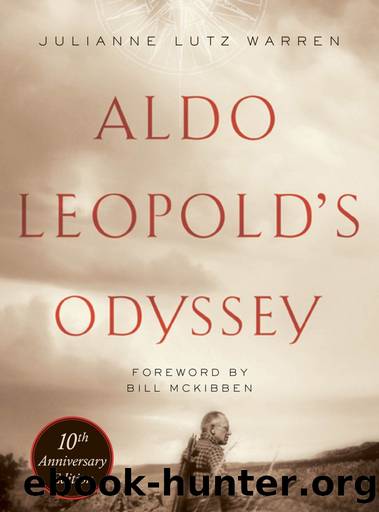Aldo Leopold's Odyssey by Julianne Lutz Warren

Author:Julianne Lutz Warren [Warren, Julianne Lutz]
Language: eng
Format: azw3
Tags: Biography & Autobiography, Nonfiction, Nature
ISBN: 9781610917544
Publisher: Island Press
Published: 2016-05-30T23:00:00+00:00
PYRRHIC VICTORY
To conquer some of the countryâs land, converting it to intensive economic use, was necessary for civilization. But to say that because some conversion was necessary, conversion of all lands was therefore good made little sense and ran against the grain of other important valuesâincluding aesthetic, historical, recreational, scientific, and moral ones. Ultimately, this mentality was also self-defeating.50 The Dust Bowl illustrated these truths dramatically.
The Dust Bowl and the conquering mentality that stimulated it received an unusually probing critique in a report issued by the federal government in 1937 titled Future of the Great Plains.51 The report was prepared by the Great Plains Committee, appointed by Franklin D. Roosevelt, with members including some of the nationâs leading land planning intellects.52 The group was to identify how the nation could help people maintain reasonable standards of living in a geographic area in which climatic conditions made special land-use considerations necessary. Like Leopold the committee blamed the Dust Bowl mainly on the failure of humans to adapt to nature, rather than simply some misbehavior by nature itself.53 Many Americans, leading up to the crisis, had believed that there were no restrictions in nature that could not be overcome with human energy. And rain would follow the plow, they thought.54 Thus, not only with plows but also with new tractors and other powerful farm machinery, millions of enterprising neighbors had torn up the semi-arid short-grass prairie on their homesteads and replaced it with wheatâwhich came to total nearly 33 million acres, or one-third of the Dust Bowl region55âintending to turn the wheat into money and more comfortable personal lives in the future. Underlying this land-use pattern were some cultural assumptions that, in light of the disaster, needed reevaluation, the report claimed.56 One of these was the belief that natural resources were inexhaustible. Another was the belief in an ownerâs unquestioned right to use private land without regard for natureâs ways, without limits, and without regard for the public interest in the future condition of such land. And implied underneath these beliefs, also calling for closer scrutiny, was the dominating American pro-expansionary, free-enterprise, fast-cash-generating ethos that had been turning farms into factories and that, in addition to its ills elsewhere, was devastatingly ill suited to conditions on the Great Plains:
The Plainsman cannot assume that whatever is for his immediate good is also good for everybody. . . . [H]e cannot assume the right always to do with his own property as he likesâhe may ruin another manâs property if he does; he cannot assume that the individual action he can take on his own land will be sufficient, even for the conservation and best use of that land. He must realize that he cannot âconquer Natureââhe must live with her on her own terms, making use of and conserving resources which can no longer be considered inexhaustible. . . . In this new point of view . . . the whole Nation has more than a sentimental stake.57
The reportâs most powerful cultural critique came in chapter 5, âAttitudes of Mind.
Download
This site does not store any files on its server. We only index and link to content provided by other sites. Please contact the content providers to delete copyright contents if any and email us, we'll remove relevant links or contents immediately.
The Light of Days by Judy Batalion(833)
The Crime Book by DK(707)
Chasing the Thrill by Daniel Barbarisi(660)
1312, Among the Ultras by James Montague(588)
The Doctor Who Fooled the World by Brian Deer(569)
E.R. Nurses by James Patterson(564)
Till Murder Do Us Part by James Patterson(561)
Invention by James Dyson(561)
The Complete Correspondence 1928-1940 by Theodor W. Adorno & Walter Benjamin(508)
Climb by Susan Spann(492)
Mind Games by Neville Southall(481)
The Reporter by Mark Paul Smith(480)
Space 2069 by David Whitehouse(479)
The Dream Architects by David Polfeldt(478)
Surely you Ìre joking, Mr Feynman by Richard Feynman(462)
If You Should Fail by Joe Moran(446)
Masterful Marks: Cartoonists Who Changed the World by Monte Beauchamp(432)
The 'Wolfman' by Sigmund Freud & Sigmund Freud(430)
Banking and Beyond by Unknown(424)
